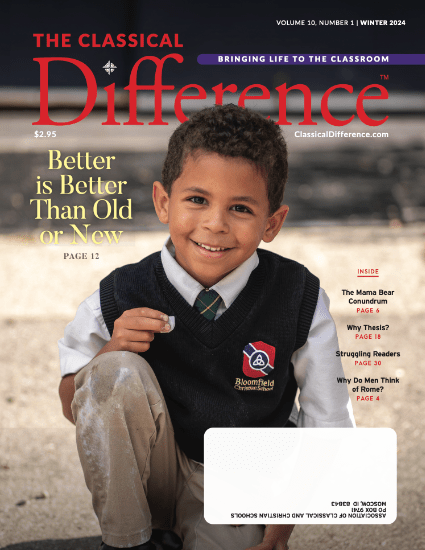By Megan Best
An answer from an alumna turned teacher
My enthusiasm for classical Christian education stems from my belief that it inspires an affectionate relationship with truth, empathy, and wisdom (among a whole host of other virtues). John Ruskin, nineteenth-century writer and art critic, once wrote:
The entire object of true education is to make people not merely do the right things, but enjoy the right things—not merely industrious, but to love industry—not merely learned, but to love knowledge—not merely pure, but to love purity—not merely just, but to hunger and thirst after justice.
Ruskin’s idea of true education implies the existence of false education. False education only teaches students “how to get through” the academic disciplines, and fails to mention that there is an opportunity to love the disciplines themselves. True education, or classical Christian education, stretches students’ imaginations beyond immediate results and stirs a sense of wonder that endures eternally.
TRUTH, EMPATHY, AND WISDOM
“What is truth?” That age-old question pitched at Jesus by Pontius Pilate reminds me of our instinctive human curiosity. As Christians, we know that Jesus is Himself the truth (John 14:6). He came into the world to reveal and uncover the plan of God’s salvation.
A student’s pursuit of truth, then, is one that always reveals more than originally anticipated. The questions that arise while studying Homer’s epics, biblical history, Newton’s laws, Aesop’s fables, or Euclid’s geometry require serious reflection within a classroom. Classical Christian education is the traditional guide for such inquiries, and students are left with the truth Himself.
When students engage with history, literature, art, music, math, and the sciences, they learn about universal human experience and knowledge. Thoughtful connection with the stories and discoveries that shape our world creates space for students to be more aware of others. In the process, students cultivate wisdom from the mistakes and achievements of their fictional, and actual, predecessors.
The classical Christian model strives to give families access to a depth of rich traditions. Much like an all-inclusive cruise vacation where families can eat and play at any time, classical Christian education never wants to leave the heart or mind wanting. Social media apps, how-to books, and other ingenious inventions will come and go. They always change based on human desires or vices. Classical Christian education, though, links itself with the best parts of hu- man culture, and unites students with long-lasting, forever relevant ideas.












